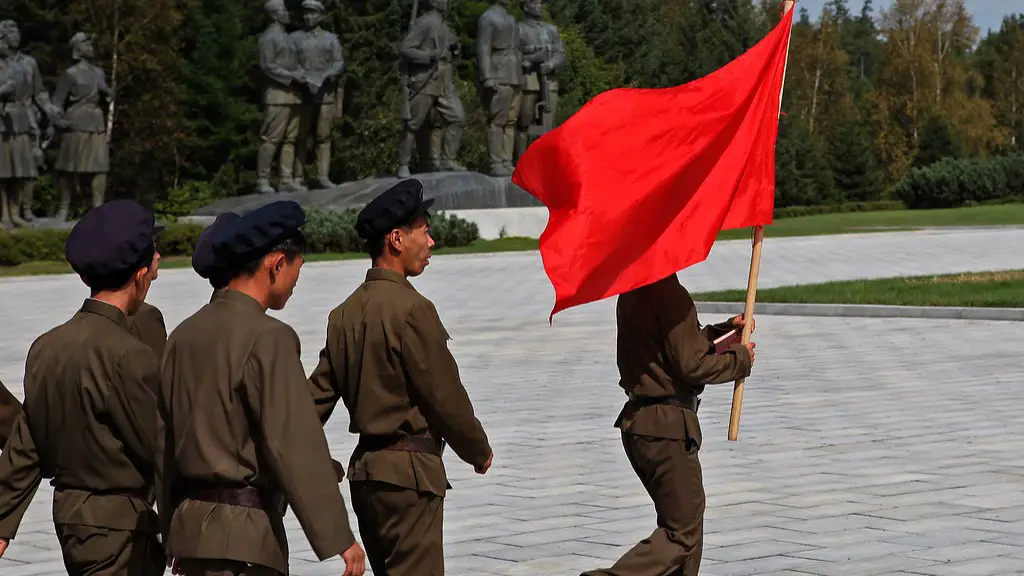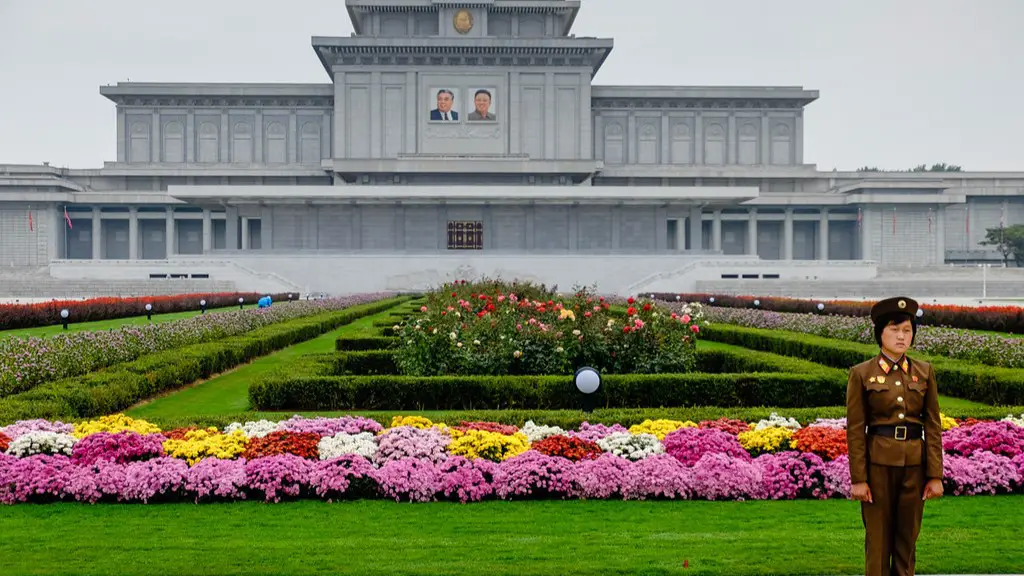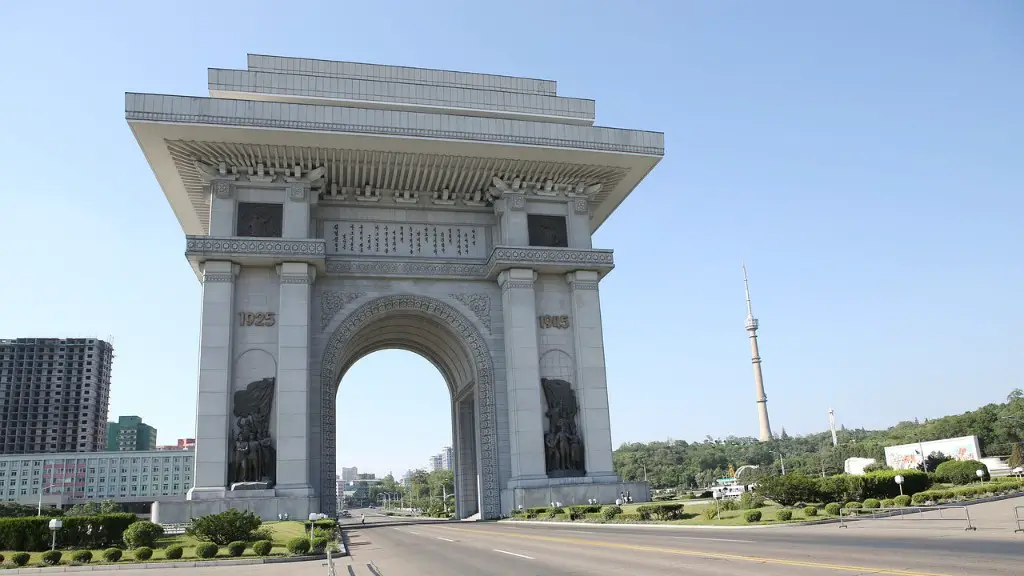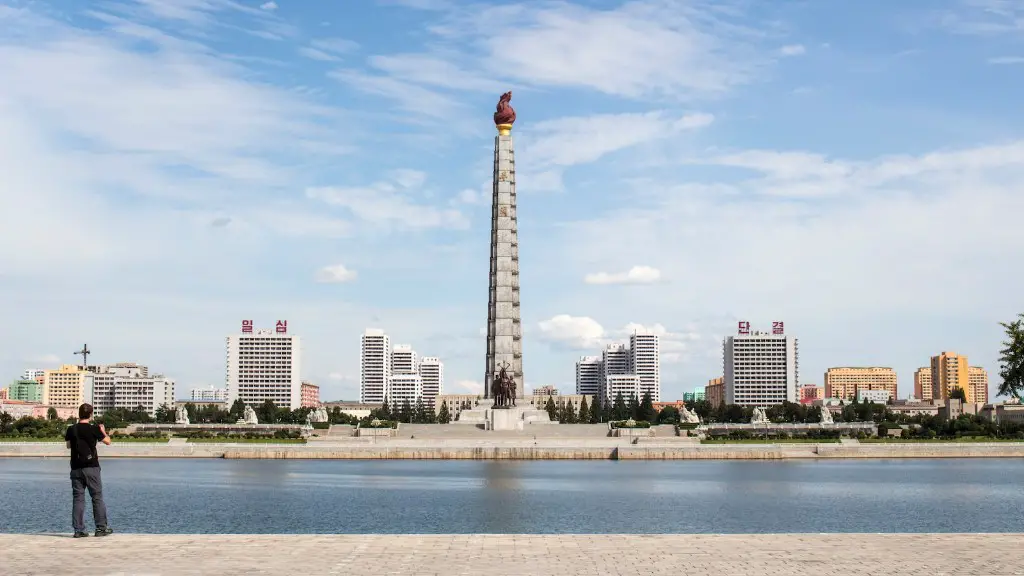For decades, North Korea has been shrouded in mystery as it has remained largely off-limits to the public, holding back information on its nuclear program. Moreover, its economy has been crippled by its heavy reliance on foreign aid, making it difficult to gauge who really funds the country. Who, then, is responsible for North Korea’s continued development?
The answer is complex and often varies depending on the situation, though there are several key players. The two big names that appear to be implicated in North Korea’s finances are China and Russia. According to reports from the United Nations, both of these countries have provided North Korea with substantial amounts of financial assistance, including but not limited to grants, technological and scientific assistance, and goods and services. Additionally, North Korea receives aid from countries such as France, Switzerland and South Korea.
Beyond aid, the country also reportedly receives massive amounts of money from the sale of weapons, including missiles and other weapons to nations in the Middle East and Asia. It is estimated that North Korea earns approximately $1.5 billion annually from such activities, which are also thought to fund its nuclear weapons program. Beyond these entities, North Korea is believed to also receive funding from criminal activities, such as drug trafficking, counterfeiting, and even cyber-crime.
In spite of all of this, North Korea is still an incredibly impoverished nation. The majority of North Koreans lack basic necessities such as electricity, and the country faces food shortages and a lack of access to potable water. This situation is caused by factors such as a lack of investment, infrastructure, and the government’s continued repression of its people.
The international community has sought to curtail North Korea’s activities by implementing economic sanctions, which are intended to weaken the country’s economy and thus limit its access to funds. However, these sanctions have been largely ineffective as North Korea continues to find new ways to circumvent them. This is likely due to the country’s close ties to other nations, which have provided them with avenues to acquire money.
Overall, North Korea’s funding remains largely shrouded in mystery, though the consensus is that it comes from a variety of sources. None of the countries that have provided aid to North Korea have claimed to be responsible for the country’s nuclear weapons program, though most are aware that their money is being used to support it. It is clear that North Korea will continue to rely on other countries to finance its activities as long as its isolation persists.
Illegal Finance Sources
Not all of North Korea’s finance sources are openly discussed. In addition to more conventional forms of aid, North Korea is thought to receive funding from a number of illegal activities. These activities range from drug smuggling to cyber-crime, with the latter earning North Korea an estimated $2 billion per year.
The regime has also been accused of cyber-hacking, with multiple cyber-attacks targeting banks and foreign companies being traced back to North Korea. Additionally, North Korea is thought to be behind a number of ransomware attacks, in which hackers freeze computers until a payment is made. This, along with other cyber-crimes, is believed to be a major source of income for the country.
Counterfeiting is also believed to be another source of income for the regime. It is estimated that North Korea is responsible for the manufacture and sale of items such as cigarettes and medicines, as well as counterfeit foreign currency.
Though these activities are mostly done in secret, they are widely believed to be a major source of income for the regime. However, it is difficult to estimate just how much money these activities generate, as the activities and their participants remain shrouded in secrecy.
Other Financial Connections
In addition to receiving funding from other nations, North Korea has also developed strong financial ties with other countries. This is likely due to the regime’s policy of isolation, which has led to the formation of close ties with foreign states, such as Venezuela and Iran.
Venezuela is believed to be a major source of funding for North Korea, in both cash and oil. The two countries have developed a close partnership over the years, with North Korea providing assistance with Venezuela’s energy sector and helping to develop its military. Reports suggest that the two countries have formed a joint venture, with North Korea providing the funding and manpower for a Venezuelan oilfield.
Reports suggest that Iran is also a major source of income for North Korea, with the two countries having a longstanding relationship. Iran is thought to be providing money to North Korea, as well as access to technology, in exchange for access to North Korean-made military equipment, such as missiles and nuclear technology.
Overall, it is difficult to gauge without a doubt who exactly is responsible for North Korea’s continued development. The country appears to receive funding from a variety of sources, both legal and illegal, which continue to supply it with the funds needed to sustain its operations.
Relations With China and Russia
Despite its isolation, North Korea maintains strong ties with two prominent players in international politics: China and Russia. Both of these countries have provided North Korea with large amounts of aid over the years and appear to be instrumental in its continued funding.
China is believed to be North Korea’s most important ally, with the Chinese government providing the country with financial and technological support. According to reports from the United Nations, China has provided North Korea with over $1 billion worth of aid since 2004. The Chinese government is also believed to be a major supplier of North Korean goods, as it actively supports the country’s weapons and missile programs.
In addition to China, Russia has also been a major source of aid for North Korea. Reports suggest that since 2009, Russia has provided North Korea with more than $15 billion of direct financial assistance. On top of this, Russia has also been supplying North Korea with goods and oil, as well as technological and scientific assistance.
It is clear that China and Russia have long been strong supporters of North Korea and continue to provide substantial levels of funding and assistance. However, it is unclear as to what role they are playing in the country’s recent activity as the regime remains largely shrouded in secrecy.
Implications On The International Stage
As the world’s eyes turn towards North Korea, the implications that this country’s activity has on the international stage cannot be understated. Its relationships with its benefactors, such as China and Russia, come with geopolitical ramifications and can affect the global economy.
The international community has sought to contain North Korea’s activities by imposing economic sanctions. These sanctions are intended to weaken the country’s economy and reduce its access to funds. However, North Korea continues to find new ways to circumvent them. This has led to tension between the United States and China and Russia, two of North Korea’s primary allies.
It is now more important than ever for the international community to come to a consensus on North Korea’s activities and the countries that support them. This is essential in order to reign in the country’s nuclear ambitions and ensure that it is not funding its activities through illegal means.
The Question Of Accountability
North Korea’s funding sources remain largely unknown, and it is difficult to ascertain who is truly to blame for its continued development. While some countries have openly provided aid to the country, most notably China and Russia, the majority of its funding appears to come from illegal activities, which are done in near total secrecy.
Though the international community has sought to reign in North Korea’s activities, it is unclear if any of the involved countries will be held accountable for their actions. As long as these countries remain uninvolved in identifying North Korea’s funding sources, it is unclear if anything will change.
It is now up to the international community to establish diplomatic channels to seek a resolution and prevent any further funding of illegal activities. This is essential if the world is to achieve lasting peace and stability.
Civilian Impact
Though North Korea’s financial activity may seem distant and far removed from the lives of everyday citizens, the reality is that its actions consequentially impact everyday people in ways that are often overlooked. These effects are especially prominent in North Korea itself, where citizens continue to suffer due to the country’s dire economic and social situations.
The most significant consequence of North Korea’s activities is the severe poverty in which many of its citizens live. According to reports from international organizations, the country’s government is directly responsible for the deprivation that its citizens suffer. In addition to a lack of basic necessities, such as food and water, reports suggest that North Koreans also suffer from malnourishment and poor living conditions.
The international community has sought to alleviate this situation by providing aid to North Korea, though the country continues to resist. It is clear that until the regime’s activity is reigned in and its funding sources identified, its citizens will continue to suffer.
The Role Of Organizations
International organizations have played a large role in holding North Korea to account and attempting to reign in its activities. The United Nations has long condemned the country’s human rights violations and sanctioned its nuclear weapons program, though these sanctions have been largely ineffective.
Additionally, NGOs have been established to support and assist the North Korean people. Organizations such as Human Rights Watch and Amnesty International have been active in condemning North Korea’s human rights abuses and providing assistance to North Korean refugees. Another organization, the North Korean Humanitarian Initiative, has been actively involved in providing aid and has recently opened a medical clinic in partnership with a North Korean hospital.
These organizations have been instrumental in assisting North Korea’s citizens and providing a voice for the oppressed people of the country. Their continued involvement is essential if the international community is to achieve a lasting resolution to the situation in North Korea.
Conclusion
Since its emergence as an isolated nation-state, North Korea has been heavily reliant on foreign aid and other financial sources in order to sustain its economy. Multiple countries have been implicated in providing funding to the country, though the primary sources remain unknown. On top of this, North Korea’s activities have had a severe effect on its citizens, who continue to suffer due to the country’s dire economic and social situations.
It is now up to the international community to take action and reign in North Korea’s activities. This requires the involvement of organizations and countries that have been implicated in providing funding to the country, as well as a greater understanding of the country’s funding sources.





